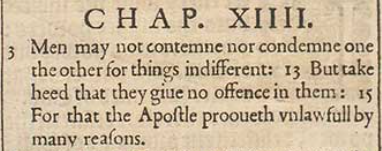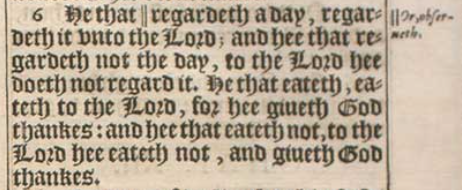Römer Kapitel 14 - Gottes Urteil
CHAP. XIV.
3 Men may not contemne nor condemne one the other for things indifferent: 13 But take heed that they giue no offence in them: 15 For that the Apostle prooueth vnlawfull by many reasons.

1 Empfangt ihr den, der schwach im Glauben ist, aber nicht für ||fragwürdige Streitgespräche.[||oder: nicht, um seine fragwürdigen Gedsanken zu verurteilen]
1 Him that is weake in the faith receiue you, but not to ||doubtfull disputations.[||Or, not to iudge his doubtfull thoughts.]

2 Denn einer glaubt, dass er alle Dinge essen möge: Ein anderer, der schwach ist, isst Kräuter.
2 For one beleeueth that he may eat all things: another who is weake, eateth herbes.

3 Lasst nicht denjenigen, der isst, den verachten, der nicht isst: Und lasst nicht denjenigen der nicht isst, den verurteilen, der isst. Denn Gott hat ihn empfangen.
3 Let not him that eateth, despise him that eateth not: and let not him which eateth not, iudge him that eateth. For God hath receiued him.

4 Wer bist du, der eines anderen Menschen Diener beurteilt? Für seinen eigenen Meister steht oder fällt er; Ja, er wird aufrecht gehalten werden: Denn Gott ist fähig ihn aufrecht zu machen.
4 Who art thou that iudgest an other mans seruant? to his owne master he standeth or falleth; Yea he shall bee holden vp: for God is able to make him stand.

5 Ein Mann schätzt einen Tag über den anderen: Ein anderer schätzt jeden Tag gleich. Lasst jeden Menschen von seinem eigenen Denken völlig überzeugt sein.[||oder: voll bestärkt sein]
5 One man esteemeth one day aboue another: another esteemeth euery day alike. Let euery man bee ||fully perswaded in his owne minde.[|| Or, fully assured.]


6 Derjenige, der einen Tag ||achtet, achtet ihn vor dem Herrn; und derjenige, der den Tag nicht achtet, achtet ihn nicht vor dem Herrn. Derjenige, der isst, isst vor dem Herrn, denn er gibt Gott Dank: Und derjenige, der nicht isst, isst nicht vor dem Herrn und gibt Gott nicht Dank.[||oder: einhält]
6 He that || regardeth a day, regardeth it vnto the Lord; and hee that regardeth not the day, to the Lord hee doeth not regard it. He that eateth, eateth to the Lord, for hee giueth God thankes: and hee that eateth not, to the Lord hee eateth not, and giueth God thankes.[||Or, obserueth.]

7 Denn keiner von uns lebt für sich selbst und keiner stirbt für sich selbst.
7 For none of vs liueth to himselfe, and no man dieth to himselfe.

8 Denn ob wir leben, leben wir dem Herrn: Und ob wir sterben, sterben wir dem Herrn: Ob wir leben oder sterben, sind wir des Herrn.
8 For whether we liue, we liue vnto the Lord: and whether wee die, we die vnto the Lord: whether wee liue therefore or die, we are the Lords.

9 Denn zu diesem Zweck ist Christus sowohl gestorben, als auch auferstanden, dass er Herr sowohl der Toten als auch der Lebendigen sein möge.
9 For to this ende Christ both died, and rose, and reuiued, that hee might be Lord both of the dead and liuing.

10 Aber warum beurteilst *du deinen Bruder? Oder warum verachtest du deinen Bruder? Wir werden alle vor dem Richterstuhl von Christus stehen.[*2. Korinther 5:10]
10 But why doest *thou iudge thy brother? or why dost thou set at nought thy brother? wee shall all stand before the Iudgement seat of Christ.[*2.Cor.5. 10.]

11 Denn es ist geschrieben "*Da ich lebe", sagt der Herr "wird sich mir jedes Knie beugen und jede Zunge wird vor Gott bekennen.[*Jesaja 45:23]
11 For it is written, *As I liue, saith the Lord, euery knee shall bow to mee, and euery tongue shall confesse to God.[*Esay 45. 23.]

12 So wird dann ein jeder von uns Gott Rechenschaft über sich selbst ablegen.
12 So then euery one of vs shall giue accompt of himselfe to God.

13 Lasst uns deshalb einander nicht mehr beurteilen: Sondern beurteilt vielmehr dies, dass niemand einen Stolperstein oder eine Gelegenheit zum Fall in seines Bruders Weg setze.
13 Let vs not therefore iudge one another any more: but iudge this rather, that no man put a stumbling blocke, or an occasion to fall in his brothers way.

14 Ich weiß und bin überzeugt durch den Herrn Jesus, dass da nichts +unrein aus sich selbst ist: Aber für den, der irgend etwas +unrein zu sein schätzt, für den ist es unrein.[+griechisch: gottlos +griechisch: gottlos]
14 I know, and am perswaded by the Lord Iesus, that there is nothing +vncleane of it selfe: but to him that esteemeth any thing to bee +vncleane, to him it is vncleane.[+Gr. common. , +Gr. common.]

15 Aber wenn dein Bruder über deine Speise betrübt ist, so wandelst du nun nicht +wohltätig. Verderbe nicht den mit deiner Speise, für den Christus gestorben ist.[+griechisch: gemäß der Wohltätigkeit 1. Korinther 8:11]
15 But if thy brother be grieued with thy meate: now walkest thou not +charitably. Destroy not him with thy meat, for whom Christ died.[+Gr. according to charitie. 1.Cor. 8.11.]

16 Lass dann nicht von deinem Guten böse gesprochen werden.
16 Let not then your good be euill spoken of.

17 Denn das Königreich Gottes ist nicht Speise und Trank; sondern Rechtschaffenheit und Friede und Freude im heiligen Geist.
17 For the kingdome of God is not meat and drinke; but righteousnes, and peace, and ioy in the holy Ghost.

18 Denn derjenige, der in diesen Dingen Christus dient, ist für Gott annehmbar und anerkannt von den Menschen.
18 For hee that in these things serueth Christ, is acceptable to God, and approued of men.

19 Lasst uns deshalb den Dingen nachgehen, die Frieden schaffen und Dingen, womit einer den anderen erbauen möge.
19 Let vs therefore follow after the things which make for peace, and things wherewith one may edifie an other.

20 Denn Speise zerstört nicht das Werk Gottes: Alle *Dinge sind in der Tat pur; aber es ist schlimm für den Menschen, der mit Verleitung isst.[*Titus 1:15]
20 For meat, destroy not the worke of God: all *things indeed are pure; but it is euill for that man who eateth with offence.[*Tit.1.15.]

21 Es ist gut, weder *Fleisch zu essen noch Wein zu trinken, noch irgendetwas, wodurch dein Bruder strauchelt oder verleitet wird oder schwach gemacht wird.[*1. Korinther 8:13]
21 It is good neither to eate *flesh, nor to drinke wine, nor any thing whereby thy brother stumbleth, or is offended, or is made weake.[*1.Cor.8. 13. ]


22 Hast du Glauben? Habe ihn für dich selbst vor Gott. Glücklich ist derjenige, der sich nicht selbst verurteilt in der Sache, die er zulässt.
22 Hast thou faith? haue it to thy selfe before God. Happie is he that condemneth not himselfe in that thing which hee alloweth.

23 Und derjenige, der zweifelt, ist verdammt, wenn er ist, denn er ißt nicht durch Glauben: Denn was auch immer nicht vom Glauben ist, ist Sünde.[||oder: unterscheidet, & setzt einen Unterschied zwischen Speisen]
23 And hee that ||doubteth, is damned if hee eate, because hee eateth not of faith: For whatsoeuer is not of faith, is sinne.[||Or, discerneth, & putteth a difference between meats]

